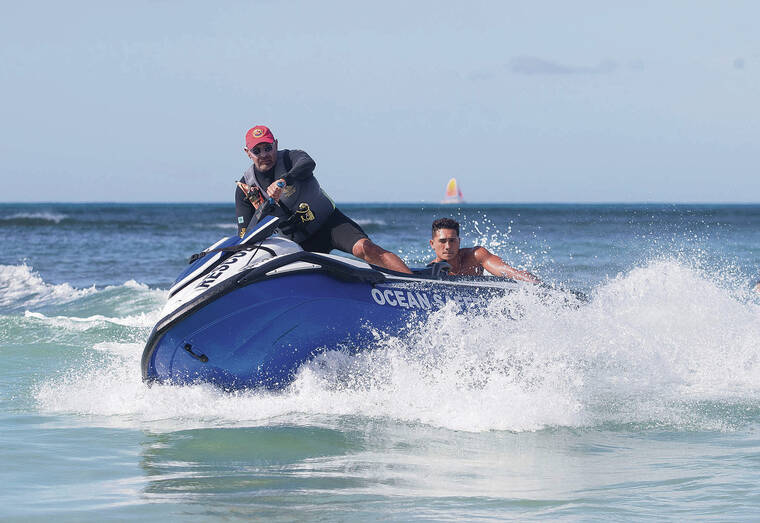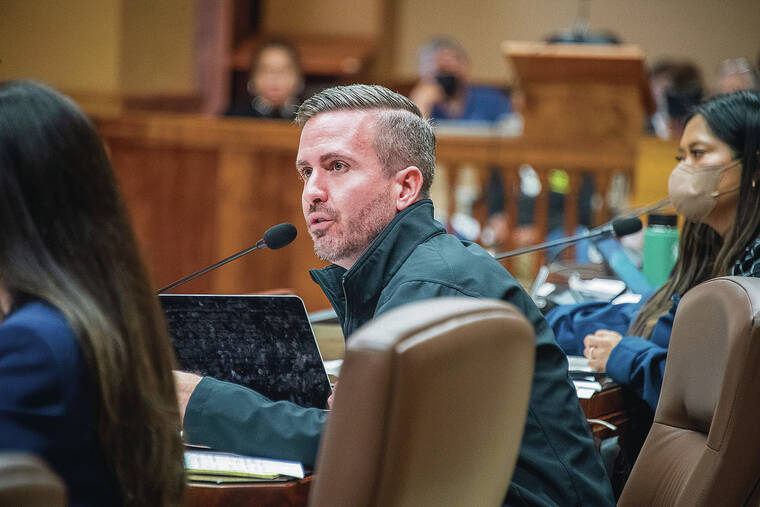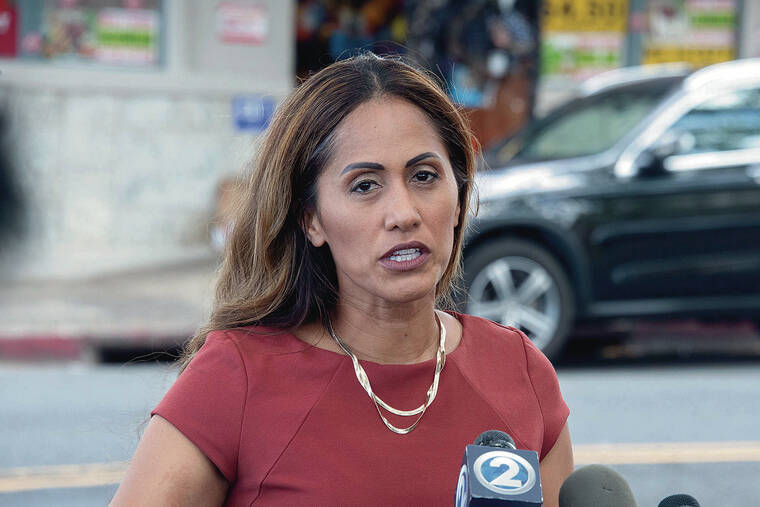Those for and against
contending city resolutions to transform Honolulu’s 277-member Ocean Safety Division into a full-fledged city department voiced their concerns during the City Council’s meeting Wednesday.
Two resolutions proposing charter amendments to establish a new and independent city Department of Ocean Safety, with or without an oversight commission, were discussion-only items.
But one resolution — Council member Matt Weyer’s Resolution 92, which offers a commission with no department attached to it — was approved for a first-
reading vote of the panel this week.
Mayor Rick Blangiardi’s Resolution 103 would, via the mayor’s executive authority to reorganize city departments, expand lifeguard services more quickly on Oahu without putting that question to voters.
That plan, following the report of a 14-member Ocean Safety Task Force
issued in early March, would remove the lifeguard division from the existing Honolulu Emergency Services Department.
The new sector would be for the city’s 2026 fiscal year budget cycle, which begins July 1, 2025.
Council member Andria Tupola introduced Resolution 50, which urges, via
voter-approved charter amendment, that Honolulu’s lifeguard and paramedic services be broken up to create that new Ocean Safety
department.
Resolution 50 — which
requests language be placed on the Nov. 5 general election ballot — also calls for a “board, creating accountability and oversight similar to that provided by the city’s Fire Commission and Police Commission over the city’s other public safety departments, the Honolulu Fire Department and Honolulu Police Department.”
Blangiardi’s administration wants a commission to be brought forward separately to voters in November.
The city’s stated concern over Tupola’s Resolution 50 is that, if given to voters, the ideas for an expanded city ocean safety department and its oversight commission might both be shot down at the polls, leaving little chance for future creation.
Weyer’s Resolution 92 would see the proposed commission consist of five members who will have the power to “appoint such staff and engage consultants as necessary for the performance of its duties.”
That panel also would “adopt rules necessary
for the conduct of its business and review rules for
the administration of the
department of ocean safety,” Weyer’s resolution states.
If Weyer’s charter amendment question goes to voters in the 2024 general election, the commission would take effect Jan. 1, 2025, the legislation states.
According to the city, the estimated cost to run a new Ocean Safety department will be about $1.4 million
annually.
At the Council meeting, those for and against the mayor’s Resolution 103 and Tupola’s Resolution 50 offered their respective opinions. Former Ocean Safety Task Force members — who emerged in March with the group’s sole recommendation that Ocean Safety should “be its own stand-alone department” in the city — were among the testifiers.
Joey Cadiz, a current city and county lifeguard and a task force member, said he supported Resolution 103. And he added that he was “fearful along with many of my colleagues” to see this go to the ballot in November.
“One, the community is not necessarily fully informed on the subject,” he said. “It is a very complex subject.”
He added “at the same time, lifeguard services will remain the same on the beach whether we are with EMS or are a stand-alone department. So the effects on the public, in that sense, are unaffected.”
But fellow task force member and former city and county lifeguard Bryan Phillips disagreed, saying a new stand-alone ocean safety department should have a commission, as proposed under Tupola’s Resolution 50.
“The best direction forward is allowing the public to have a say whether they want a commission in this department,” he said, adding Resolution 103 would involve mayoral appointment of city directors without public oversight. “So there’s a lot of questions, there is no plan that we’ve seen.”
“We’ve only seen this sort of ‘Let’s stand this thing right up’ with no real plan forward and no real process in place, so it’s a heavy concern of mine to see how that will play out,” he added.
Phillips noted a commission overseeing a public safety department is “nationwide best practice” and would be “just like our brothers and sisters at fire and police.”
Sarah Fairchild, a task force member and the executive director of the Outrigger Duke Kahanamoku Foundation, also supported a department with a commission “rather than a department head who is directly, politically appointed.”
“We’ve a great opportunity here to be a national leader, and we need to get it right from the start,” she said. “We need a commission set up first who can oversee the new department head from Day 1.”
She added that “regardless of what the city decides to do, we need a transparent plan and timeline.”
Cecelia Chang, a retired city and county deputy
corporation counsel, also
disapproved of a public safety department without public oversight.
“My concern is if it doesn’t go to ballot we will be stuck with a department-appointed head,” she said. “And having worked in Corporation Counsel it’s not pretty. The politics only start to come to fruition, then you have the Kealoha mess,” noting the infamous Honolulu Police Department corruption scandal.
“I cannot emphasize enough the need for impartiality,” Chang added.
Conversely, Oahu resident Tim Garry said he wanted to see the new Ocean Safety department now.
“Let’s get it going, let’s budget it,” Garry said.
But Oahu resident Choon James said a commission was ideal, to have “independence and non-cronyism, that’s the big thing.”
“So it just does not become an extension of any mayor or any City Council,” she said.
Although he claimed the city supported an oversight commission, city Managing Director Mike Formby told the Council the best path forward was to quickly create the Ocean Safety department and avoid voter rejection.
Forming a commission also “means we have to wait until after November,” he added.
“I believe that the commission has to adopt rules. We would have to nominate commissioners. They would have to come to Council for approval,” he said. “So my belief is if we have to go through the full process we’re looking at fiscal year 2026 before we stand this department up.”
Under Council questioning, Formby said moving on the mayor’s Resolution 103 also meant Tupola’s resolution was unnecessary.
“That would basically not make it appropriate to go to the voters to stand up a department that’s already been stood up by the mayor,” he said. “I don’t think we want to pass out inconsistent resolutions.”
Tupola said she was agreeable to having further discussions with the Mayor’s Office over her resolution.
“I do hear that — the ballot question, the validity of it, will it survive? — all things we’ve got to take into consideration,” she said, but noted other city agencies were created by the voters. “Remember (city Department of Land Management) was created through a ballot initiative, the Office of Climate Change and Sustainability was created through a ballot initiative.”
She concluded, “I think moving forward we’re just going to have to focus on the legal parts that are going to make this succeed and whatever happens on the ballot is what’s supposed to happen.”








